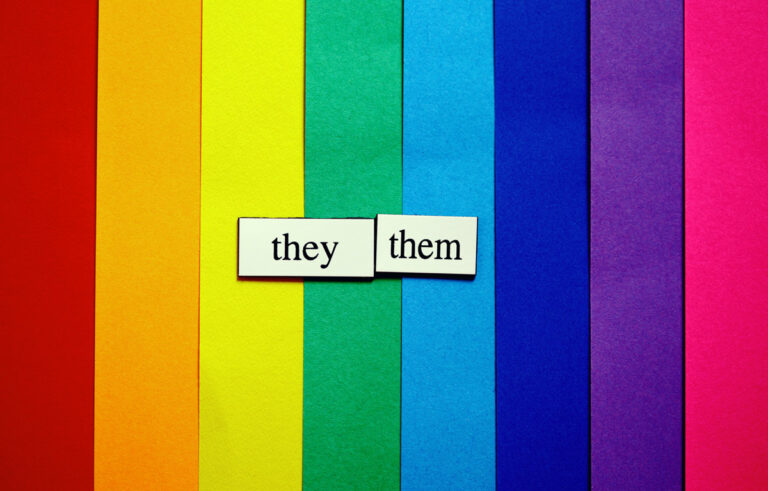Debunking the ‘wokeism’ debates behind the inclusion of gender neutral pronouns in dictionaries

Last week, French dictionary Le Petit Robert included the gender neutral pronoun ‘iel’ in its November digital update—provoking a wide variety of responses. A neologism that combines ‘il’ and ‘elle’—‘he’ and ‘she’, respectively—has seen increasing use in recent years, particularly in referring to non-binary and gender non-conforming people as well as in more neutral contexts. There are proposed feminist arguments for such developments, as otherwise the masculine tense is used as the neutral or universal, which to many carries patriarchal associations.
Dictionaries, in general, are descriptive rather than proscriptive, meaning they record how language is used—or has been used—in a given population. They are not the gatekeepers of a language. When people are outraged by the inclusion of a word in the Oxford English Dictionary (OED), the “principal historical dictionary of the English language,” it is never down to the intervention or biases of the OED’s lexicographers. Once a word is used enough, it warrants inclusion.
Things are slightly different in France though. The Académie Française—sometimes known as the French Academy—is a council that makes authoritative decisions on all matters pertaining to the French language. Unlike English, French is a highly regulated language, with the Académie tasked with publishing the official dictionary of the French language. It has consciously resisted modern English loanwords, favouring instead neologisms derived from existing French words: ‘computer’ and ‘e-mail’ are still used but, technically, ‘ordinateur’ and ‘courriel’ are the correct French terms.
As with most Indo-European languages, with English being a notable exception, French is a gendered language—with all nouns being either masculine or feminine. Some languages, such as German, have neuter, too. When a new word is coined and then used widely enough, it is the Académie that decides its gender. Resistance to a neutral or third gender is, perhaps, understandable given the huge shift this might beget. Nonetheless, to meet it with such solid conservatism, if not disdain, is disappointing. “Inclusive writing is not the future of the French language,” Jean-Michel Blanquer, the Minister of National Education since 2017, tweeted in response to the ‘iel’ debate.
A few years ago, the Académie ruled that the masculine noun ‘le ministre’ should be used to describe a government minister of any gender, despite the frequent use of ‘la ministre’ for a female minister—which is official practice in Canada, Belgium and Switzerland, where French is also an official language. 77 linguists retaliated with an opinion column that denounced “incompetency and anachronism.” Writing in 2017, they also made mention of ‘iel’, “For people who feel cramped in the binary opposition between women and men, there is currently no neutral pronoun in French: the ‘iel’ form, as well as many other new forms, are changing and could allow this need to be understood.”
“Let the Academy keep its language,” they continued, concluding that, “Current grammars do not offer answers to everything.”
“The Robert has not had a sudden serious case of ‘wokeism’—a word that we promise to define soon,” the dictionary’s managing director Charles Bimbenet said last week. “It seemed useful to specify its meaning for people who come across it, whether they want to use it or, on the contrary, reject it. Defining the words at use in the world helps us to better understand it.” Who can object to this? If a word is used, people need to access resources to know what it means. Simple, right?
The sudden introduction of new pronouns seems like a radical shift—but there is significant precedent. In English, we have seen the rise of a singular ‘they’, which resists the introduction of any new words and can be traced back to 1375. But neopronouns have since emerged in the English speaking world, too, particularly in queer communities to refer to trans people, non-binary and gender non-conforming individuals.
Examples include xe/xem/xyr, ze/hir/hirs, and ey/em/eir and will be unfamiliar to many, but shouldn’t be so readily dismissed; for some transgender and non-binary people, pronouns are intimately entwined with their understanding of gender, including the refusal of normativity and conformity. Neopronouns have long been the butt of the joke for the right-wing because theirs is an outlook that is inherently conservative, that opposes the progressive, inclusive, and emancipatory efforts that such changes are indicative of.
Perhaps the most notable and successful example of a newly introduced pronoun is in Swedish, where ‘hen’ was introduced as a gender neutral alternative to ‘han’ (he) and ‘hon’ (she). It was inspired by the Finnish ‘hän’, which can refer to anyone as Finnish, just like English, is a genderless language. The term has its origins in the 1960s, when linguist Rolf Dunås argued for the introduction of a gender neutral pronoun, albeit only in a local newspaper. The term was only really used in the following decades by academic and activist groups aware of and engaging in queer theory.
In 2012, the pronoun became the subject of debate—a classic culture war—when a children’s book only used ‘hen’, instead of ‘han’ and ‘hon’, for its characters. The debate has yet to reach its conclusion, with many media outlets and politicians on the right still consciously refusing to use ‘hen’, despite the word’s common usage. A 2020 research paper asked if new gender neutral pronouns are difficult to process when reading, using ‘hen’ as their case study. Researchers concluded, “The results do not support that gender neutral pronouns should be avoided because they are difficult to process.”
Perhaps the French could learn from the Swedes, although unfortunately, I fear this is unlikely. “Including gender neutral pronouns in the dictionary is not only recognising the reality of non-binary people,” a spokesperson from ILGA-Europe, an LGBTQ+ rights organisation that works across Europe and Central Asia, told PinkNews, but is also “an important step in ensuring non-discrimination and representation of non-binary people in our societies.”




